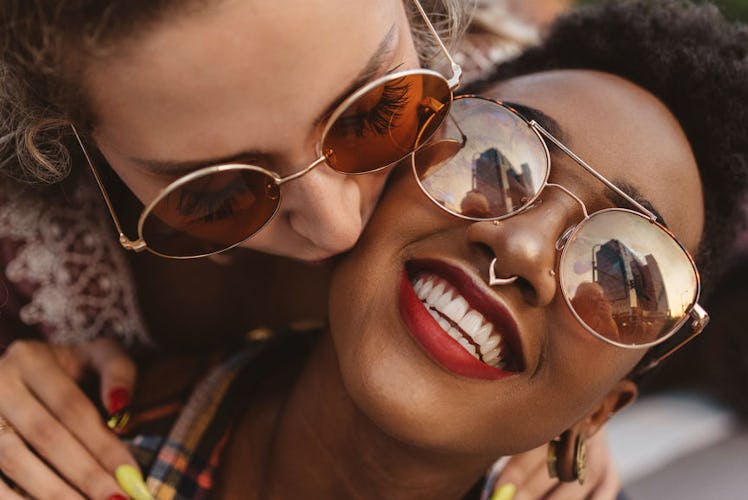
This Is How Long You Can Expect Early Relationship Butterflies To Last
You know that feeling when you first start dating someone new, and you feel giddy 98% of the time because you're so excited? You can't help but feel happy when you're around them, or even when they cross your mind, and it's like every other second a new wave of butterflies just flutters through your stomach. As your relationship continues to progress, you may find yourself asking whether or not you can make these butterflies last forever. But how long do early relationship butterflies last, really? Three years into your relationship, will you and your partner still be feeling the feels? Well, experts say it's definitely possible, but the butterflies might feel a little bit different.
Like with most factors in relationships, how long the butterflies last depends on you and your partner. It "varies from one person to the next," Dr. Gary Brown, a Los Angeles couples therapist, tells Elite Daily. "In truth, much of our early attraction involves some science. When we fall in love and experience those delicious butterflies, we are highly enamored of our new love. Chemicals in our brains — oxytocin and dopamine (sometimes referred to as the 'love hormones') are produced in great amounts that produce euphoria." The butterflies, thanks to oxytocin and dopamine, can last for as long as you're falling in love, Dr. Brown says.
"They can fade into the background even when the two of you are still going strong," Lori Salkin, matchmaker and dating coach, tells Elite Daily. "When that happens, it does not mean the relationship is fizzling, rather it's transitioning to reality." You and your partner will still share that initial spark and excitement you've had since the beginning, but perhaps without the constant belly flutters. That's because "the relationship will have more layers than just butterflies," Salkin says.
Dr. Brown refers to the time after the butterflies have faded as simply being in love. "It is less exciting at times, but this is the phase where we are now learning each other's love languages; finding out what works and is not working; hopefully learning how to communicate when conflicts arise; and the newness begins to fade a bit," he explains.
Once you've gotten past the novelty of having this person in your life, things will likely start to get a little more real. "You'll share magical date nights and stressful days, family celebrations and professional frustrations," Salkin says. When your relationship is still new, you might feel a sort of pressure to present your very best self at all times, even if you have to try a little harder than usual. Once you begin to feel comfortable, some of that pressure goes away, and you might feel more comfortable showing your partner the truest version of yourself.
"As the relationship strengthens and grows, you get to experience all of the elements of a relationship together and balance fun in courtship with reality," Salkin explains.
Ultimately, the early relationship butterflies last for as long as you and your partner are getting to know each other, falling in love, and settling into a more natural, comfortable relationship. There is no set timeline. Those butterflies then evolve into a different kind of love-fueled buzz, that might feel calmer, but still just as special. That's love, y'all! If you're worried that the end of the early-stage butterflies means the end of the relationship, fret not, it definitely doesn't have to. It just marks the start of a transition from the honeymoon phase to the beauty of what comes next.
"When [the flutters] end, as they always do, it means the relationship needs to transcend biology and evolve into something more substantive," Jennifer B. Rhodes, licensed psychologist, dating expert, and founder of Rapport Relationships, tells Elite Daily. And that evolution is, by no means, a bad thing. "True love grows, changes over time, and starts with butterflies," Rhodes says. It's only the beginning — remember that.
This article was originally published on